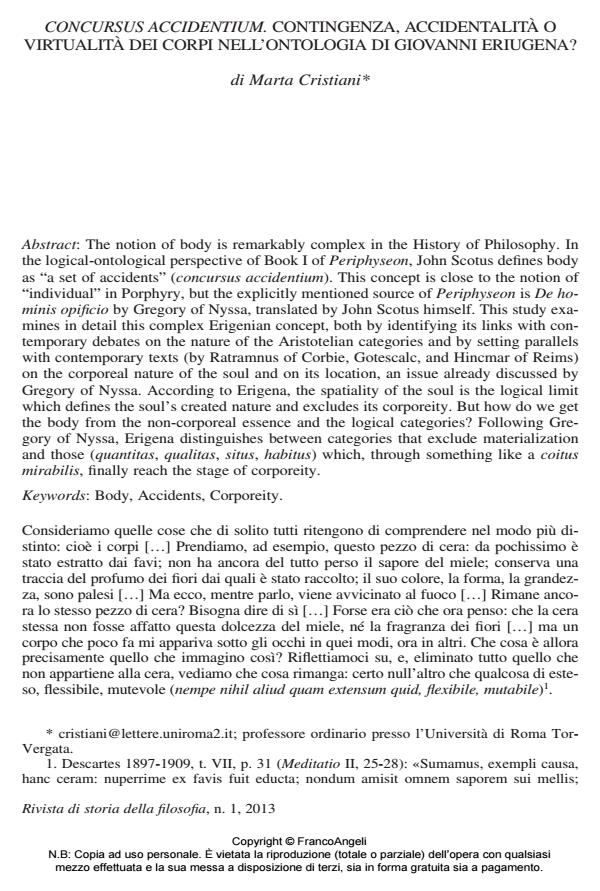Concursus accidentium. Contingenza, accidentalità o virtualità dei corpi nell’ontologia di Giovanni Eriugena?
Titolo Rivista RIVISTA DI STORIA DELLA FILOSOFIA
Autori/Curatori Marta Cristiani
Anno di pubblicazione 2013 Fascicolo 2013/1
Lingua Italiano Numero pagine 20 P. 23-42 Dimensione file 515 KB
DOI 10.3280/SF2013-001003
Il DOI è il codice a barre della proprietà intellettuale: per saperne di più
clicca qui
Qui sotto puoi vedere in anteprima la prima pagina di questo articolo.
Se questo articolo ti interessa, lo puoi acquistare (e scaricare in formato pdf) seguendo le facili indicazioni per acquistare il download credit. Acquista Download Credits per scaricare questo Articolo in formato PDF

FrancoAngeli è membro della Publishers International Linking Association, Inc (PILA)associazione indipendente e non profit per facilitare (attraverso i servizi tecnologici implementati da CrossRef.org) l’accesso degli studiosi ai contenuti digitali nelle pubblicazioni professionali e scientifiche
The notion of body is remarkably complex in the History of Philosophy. In the logical-ontological perspective of Book I of Periphyseon, John Scotus defines body as "a set of accidents" (concursus accidentium). This concept is close to the notion of "individual" in Porphyry, but the explicitly mentioned source of Periphyseon is De hominis opificio by Gregory of Nyssa, translated by John Scotus himself. This study examines in detail this complex Erigenian concept, both by identifying its links with contemporary debates on the nature of the Aristotelian categories and by setting parallels with contemporary texts (by Ratramnus of Corbie, Gotescalc, and Hincmar of Reims) on the corporeal nature of the soul and on its location, an issue already discussed by Gregory of Nyssa. According to Erigena, the spatiality of the soul is the logical limit which defines the soul’s created nature and excludes its corporeity. But how do we get the body from the non-corporeal essence and the logical categories? Following Gregory of Nyssa, Erigena distinguishes between categories that exclude materialization and those (quantitas, qualitas, situs, habitus) which, through something like a coitus mirabilis, finally reach the stage of corporeity.
Parole chiave:Body, Accidents, Corporeity.
Marta Cristiani, Concursus accidentium. Contingenza, accidentalità o virtualità dei corpi nell’ontologia di Giovanni Eriugena? in "RIVISTA DI STORIA DELLA FILOSOFIA" 1/2013, pp 23-42, DOI: 10.3280/SF2013-001003